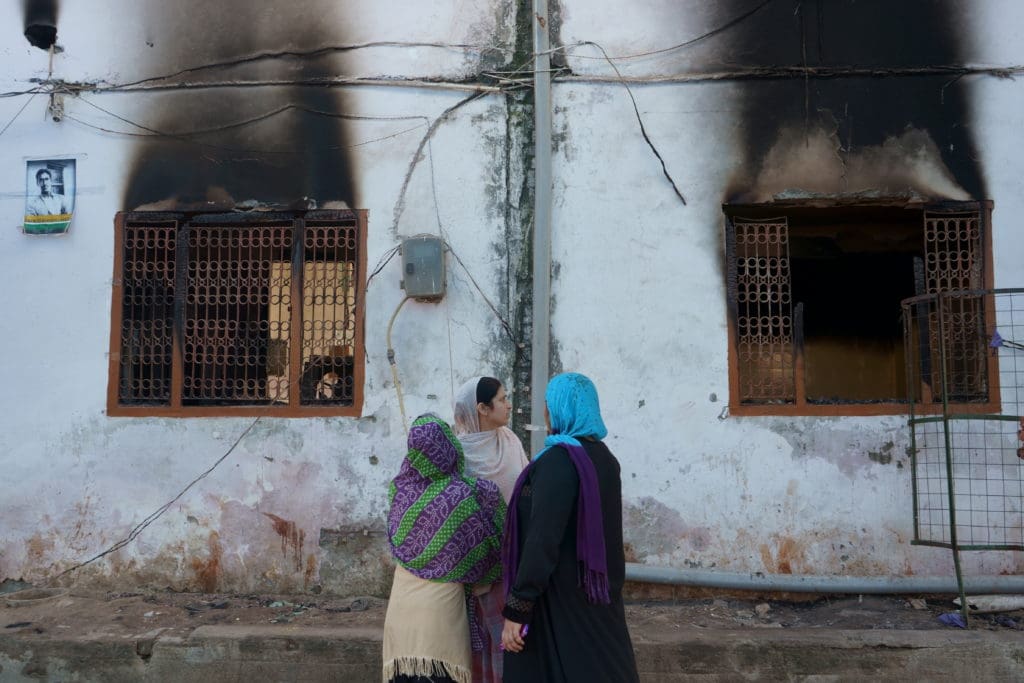
At a virtual press conference on Thursday, an international panel of human rights activists, parliamentarians, and scholars forcefully condemned the Indian government’s recent arrest and detention of human rights activist Teesta Setalvad.
Setalvad, who was arrested by Gujarat Police on the evening of June 25, has been an outspoken critic of Prime Minister Narendra Modi and the ruling Bharatiya Janata Party (BJP), and has sought to hold Modi accountable for his alleged complicity in the deadly anti-Muslim pogrom that took place in Gujarat in 2002.
The event was moderated by Hindus for Human Rights Advocacy and Outreach Coordinator Pranay Somayajula, who said that Setalvad’s arrest “demonstrates not only the growing culture of impunity for senior politicians who are accused of complicity in violence, but also highlights the Indian government’s growing crackdown on activists, dissidents, and human rights defenders…For India’s democracy to survive, every political prisoner and every prisoner of conscience must be set free.”
Setalvad’s arrest comes alongside the arrest of former Gujarat State Director-General of Police R.B. Sreekumar, who had previously testified about the complicity of authorities in the violence, as well as the arrest of journalist Mohammed Zubair, co-founder of the fact-checking website Alt News.
“Instead of protecting its citizens, what we see today is that India’s government has resorted to punishment and violence,” said Roja Suganthy-Singh, Executive Director of Dalit Solidarity Forum and Board Member of India Civil Watch International.
Husnaa Vhora, Media Associate for Indian American Muslim Council, characterized Setalvad’s arrest as “alarming, but unfortunately not surprising,” and called it “part of Modi’s ongoing crackdown against anyone who dares to criticize him or point out that he has a longstanding history of encouraging brutal violence against minorities.”
Calling the arrest an “absolute witch hunt against those fighting for equality and justice,” activist Banojyotsna Lahiri stated that “restoring the spirit of democracy in the world’s largest democracy is the world community’s responsibility.”
Lahiri’s concerns were shared by UK politician and Sheffield City Councillor Shaffaq Mohammed, who previously served as a Member of the European Parliament for Yorkshire and the Humber from 2019 to 2020. In his remarks, Councillor Mohammed noted that “democracy is not just about voting—it’s also about the rule of law and holding those in power to account, and human rights defenders and journalists are at the front lines of that fight.”
Former Australian Senator from New South Wales Lee Rhiannon added her voice to the “growing international call to release Teesta Setalvad and all prisoners of conscience.” Sen. Rhiannon stated that “India is no longer a democracy” as “the BJP is using governance of fear to clamp down on dissent.”
In addition to these international parliamentarians, Ruth Messinger —former member of the New York City Council, and current Global Ambassador for the American Jewish World Service—denounced Setalvad’s arrest as an “outrage,” and highlighted the political nature of the arrest: “Teesta was arrested because she is a dissident and a human rights defender.”
Sana Siddiq, Manager of Policy and Advocacy Campaigns for the US Campaign for Palestinian Rights (USCPR), noted the parallels between Setalvad’s arrest and the treatment of Palestinian political prisoners by the Israeli state, highlighting the “clear links between the racist, apartheid Israeli government and the rising Hindu nationalism in India.”
The conference was also joined by human rights activist Harsh Mander. Pointing out that “India’s democracy has reached its most fragile and brittle moment in its 75 years,” Mander stated in his remarks that “if Teesta’s work is a crime, then all of us, including the Indian Supreme Court of the time, are guilty of the crime of holding Gujarat’s government accountable.”
Renowned Carnatic vocalist and human rights activist T.M. Krishna similarly condemned the wrongful nature of Setalvad’s arrest, stating that “Teesta was put behind bars because she did what any citizen should do.”
Calling India’s secular democracy “one of the greatest achievements of the 20th century,” eminent scholar-activist Dr. Noam Chomsky argued that the erosion of this democracy, exemplified by the crackdown on Setalvad and other dissidents, “extinguishes the hope of India’s future.”
The final speaker in the press conference was Dr. Rajmohan Gandhi, Mahatma Gandhi’s grandson and biographer who currently serves as research professor at the Center for South Asian and Middle Eastern Studies, University of Illinois at Urbana-Champaign. In his remarks, Professor Gandhi called for the release of Setalvad and other prisoners of conscience, so that India may fulfill its “true mission” and “expand justice, equality, dignity, and harmony—not only within its borders, but in the world.”
Thursday’s press conference was jointly organized by Hindus for Human Rights, Indian American Muslim Council, Dalit Solidarity Forum, and India Civil Watch International. The full recording of the conference is available at the link below.





